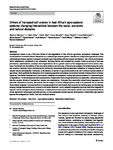Drivers of increased soil erosion in East Africa’s agro-pastoral systems: changing interactions between the social, economic and natural domains
| dc.contributor.author | Wynants, Maarten | |
| dc.contributor.author | Kelly, C | |
| dc.contributor.author | Mtei, K | |
| dc.contributor.author | Munishi, L | |
| dc.contributor.author | Patrick, A | |
| dc.contributor.author | Rabinovich, A | |
| dc.contributor.author | Nasseri, M | |
| dc.contributor.author | Gilvear, David | |
| dc.contributor.author | Roberts, C Neil | |
| dc.contributor.author | Boeckx, P | |
| dc.contributor.author | Wilson, Geoffrey | |
| dc.contributor.author | Blake, William | |
| dc.contributor.author | Ndakidemi, P | |
| dc.date.accessioned | 2019-06-10T13:16:30Z | |
| dc.date.issued | 2019-06-08 | |
| dc.identifier.issn | 1436-3798 | |
| dc.identifier.issn | 1436-378X | |
| dc.identifier.uri | http://hdl.handle.net/10026.1/14281 | |
| dc.description.abstract |
Increased soil erosion is one of the main drivers of land degradation in East Africa’s agricultural and pastoral landscapes. This wicked problem is rooted in historic disruptions to co-adapted agro-pastoral systems. Introduction of agricultural growth policies by centralised governance resulted in temporal and spatial scale mismatches with the complex and dynamic East African environment, which subsequently contributed to soil exhaustion, declining fertility and increased soil erosion. Coercive policies of land use, privatisation, sedentarisation, exclusion and marginalisation led to a gradual erosion of the indigenous social and economic structures. Combined with the inability of the new nation-states to provide many of the services necessary for (re)developing the social and economic domains, many communities are lacking key components enabling sustainable adaptation to changing internal and external shocks and pressures. Exemplary is the absence of growth in agricultural productivity and livelihood options outside of agriculture, which prohibits the absorption of an increasing population and pushes communities towards overexploitation of natural resources. This further increases social and economic pressures on ecosystems, locking agro-pastoral systems in a downward spiral of degradation. For the development and implementation of sustainable land management plans to be sustainable, authorities need to take the complex drivers of increased soil erosion into consideration. Examples from sustainable intensification responses to the demands of population increase, demonstrate that the integrity of locally adapted systems needs to be protected, but not isolated, from external pressures. Communities have to increase productivity and diversify their economy by building upon, not abandoning, existing linkages between the social, economic and natural domains. Locally adapted management practices need to be integrated in regional, national and supra-national institutions. A nested political and economic framework, wherein local communities are able to access agricultural technologies and state services, is a key prerequisite towards regional development of sustainable agro-pastoral systems that safeguard soil health, food and livelihood security. | |
| dc.format.extent | 1909-1921 | |
| dc.language | en | |
| dc.language.iso | en | |
| dc.publisher | Springer (part of Springer Nature) | |
| dc.subject | Soil erosion | |
| dc.subject | East Africa | |
| dc.subject | Agro-pastoral systems | |
| dc.subject | Sustainable intensification | |
| dc.title | Drivers of increased soil erosion in East Africa’s agro-pastoral systems: changing interactions between the social, economic and natural domains | |
| dc.type | journal-article | |
| dc.type | Review | |
| dc.type | Journal | |
| plymouth.author-url | https://www.webofscience.com/api/gateway?GWVersion=2&SrcApp=PARTNER_APP&SrcAuth=LinksAMR&KeyUT=WOS:000488930500007&DestLinkType=FullRecord&DestApp=ALL_WOS&UsrCustomerID=11bb513d99f797142bcfeffcc58ea008 | |
| plymouth.issue | 7 | |
| plymouth.volume | 19 | |
| plymouth.publication-status | Published | |
| plymouth.journal | Regional Environmental Change | |
| dc.identifier.doi | 10.1007/s10113-019-01520-9 | |
| plymouth.organisational-group | /Plymouth | |
| plymouth.organisational-group | /Plymouth/Admin Group - REF | |
| plymouth.organisational-group | /Plymouth/Admin Group - REF/REF Admin Group - FoSE | |
| plymouth.organisational-group | /Plymouth/Faculty of Science and Engineering | |
| plymouth.organisational-group | /Plymouth/Faculty of Science and Engineering/School of Geography, Earth and Environmental Sciences | |
| plymouth.organisational-group | /Plymouth/REF 2021 Researchers by UoA | |
| plymouth.organisational-group | /Plymouth/REF 2021 Researchers by UoA/UoA14 Geography and Environmental Studies | |
| plymouth.organisational-group | /Plymouth/REF 2021 Researchers by UoA/UoA14 Geography and Environmental Studies/UoA14 Geography and Environmental Studies MANUAL | |
| plymouth.organisational-group | /Plymouth/Research Groups | |
| plymouth.organisational-group | /Plymouth/Research Groups/Centre for Research in Environment and Society (CeRES) | |
| plymouth.organisational-group | /Plymouth/Research Groups/Centre for Research in Environment and Society (CeRES)/CeRES (Reporting) | |
| plymouth.organisational-group | /Plymouth/Research Groups/Marine Institute | |
| plymouth.organisational-group | /Plymouth/Users by role | |
| plymouth.organisational-group | /Plymouth/Users by role/Academics | |
| plymouth.organisational-group | /Plymouth/Users by role/Researchers in ResearchFish submission | |
| dcterms.dateAccepted | 2019-05-23 | |
| dc.rights.embargodate | 2019-6-12 | |
| dc.identifier.eissn | 1436-378X | |
| dc.rights.embargoperiod | Not known | |
| rioxxterms.versionofrecord | 10.1007/s10113-019-01520-9 | |
| rioxxterms.licenseref.uri | http://www.rioxx.net/licenses/all-rights-reserved | |
| rioxxterms.licenseref.startdate | 2019-06-08 | |
| rioxxterms.type | Journal Article/Review | |
| plymouth.funder | "International". Jali Ardhi [Care for the Land] project: Realising land management change in degraded Maasai grazing lands.::NERC | |
| plymouth.funder | "International". Jali Ardhi [Care for the Land] project: Realising land management change in degraded Maasai grazing lands.::NERC |


